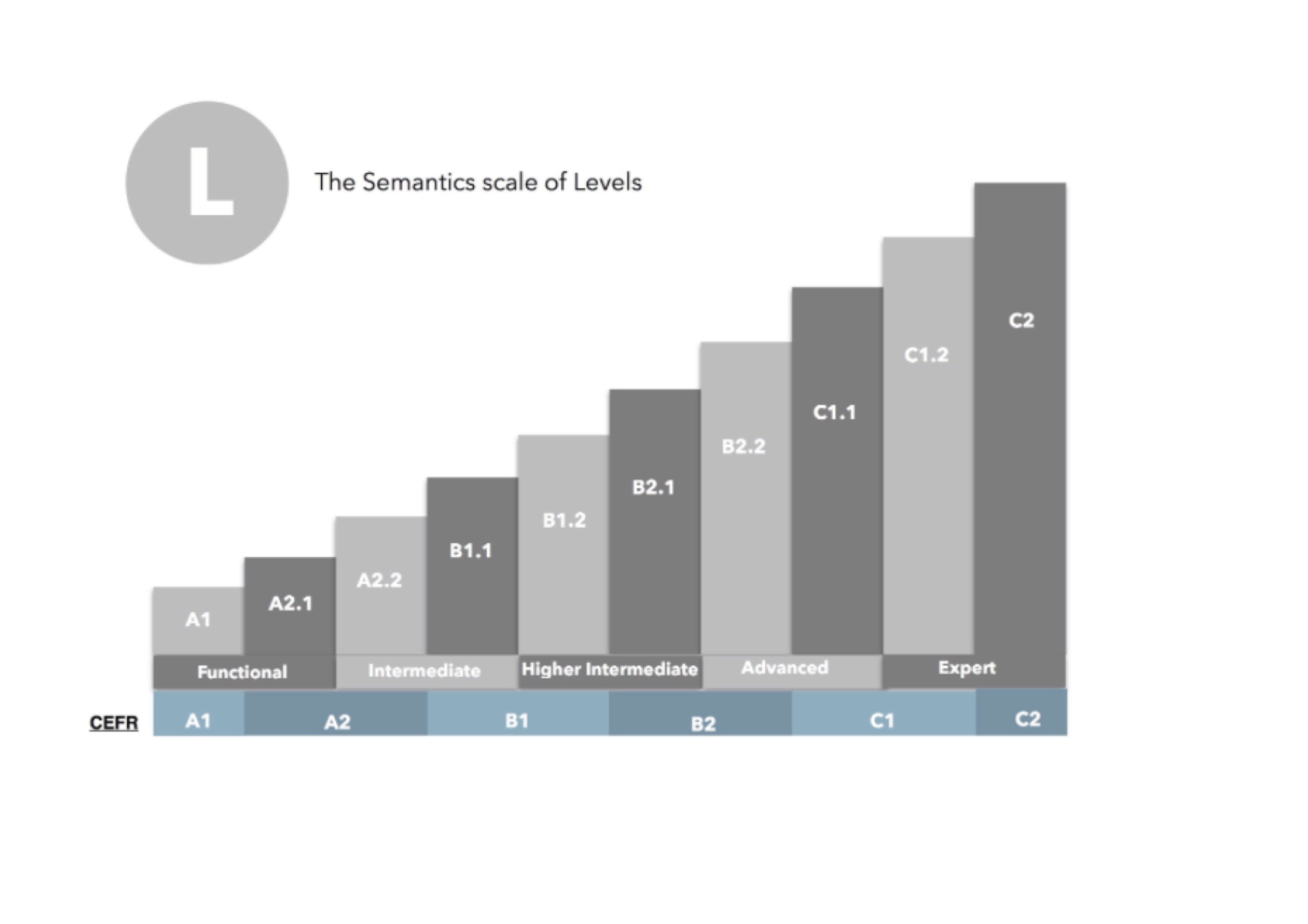Levels

Semantics uses a scale of 10 levels, based on the Common European Framework (CEF), whereby each level represents a certain skill set.
Based on the preliminary screening we place the student on this scale and link his objectives to a target level. In this way we can clearly see the gap between the actual level and the level that needs to be reached. We then recommend a certain track in order to close the gap and reach the target. On average we can ensure the following progress:
- Individual training: 30 hours
- Semi-individual training (2-3): 38 hours
- Group training (4-6): 44 hours
This estimated progress is an average, based on studies performed by Semantics and on the particularly direct and structured method applied by Semantics' language coaches.
Meaning of the different levels
A0: No knowledge of the language whatsoever
A1: You can understand and use well-known everyday phrases and simple sentences. You can introduce yourself and ask other people simple questions about themselves – for example, where they live, how they are, or what they like. You can also answer those questions. You can participate in simple conversations if the person you are speaking to speaks slowly and helps you by repeating themselves.
A2.1: You can understand and transmit simple messages. You can handle clearly expressed information and lead simple conversations. You can describe daily activities at work and home, using simple phrases and sentences. You can ask about and understand information related to everyday activities, such as shopping or making reservations for a holiday or hotel.
A2.2: You can understand the general context of a conversation on known topics, in social and business surroundings. You can start, hold, and end a conversation. You can participate in simple discussions, give simple professional directions, highlight problems, and present solutions. You can express congratulations, approval or rejection, or complaints.
B1.1: You can understand information on known topics in a relevant context and hold a conversation on general topics. You are able to business contacts, give advice and suggestions. You can execute more complex activities, such as exchanging goods, or cancelling orders. You are able to write notes, messages, and personal letters, in order to, for example, thank someone for something.
B1.2: You can hold a conversation in various surroundings and on numerous topics. You can give coherent descriptions or reports. At work, you can ask and answer questions. You are able to give general instructions for procedures with ease. You feel comfortable in familiar situations in your social and business surroundings. You can, for example, discuss the quality of products or services.
B2.1: You are able to communicate with ease in many business and social situations and can find various ways of expressing the same thing. You can handle various topics in an appropriate way. You can participate in conversations with several native speakers with ease. You are able to discuss projects and express proposals, opinions, or ideas. You can hold long telephone conversations or organize a trip without any difficulty.
B2.2: You are able to express your opinions and defend your opinions in a discussion. You are able to understand expressions used by native speakers. You can handle complex situations or mediate a difference of opinions You use the right words at the right time, and are generally capable of solving various situations at work. You can give presentations, summarize facts, and use the foreign language in very complicated situations.
C1.1: You are able to efficiently and precisely communicate in complex tasks in various situations. You can participate in all conversations in social and business surroundings with ease. You are able to give a professional presentation at a meeting or at a sales conference You can easily express yourself in detail, and even follow speeches/seminars on complex topics.
C1.2: You can efficiently communicate with various people on a wide range of familiar and new topics, while simultaneously meeting all language requirements. You can participate in discussions and meeting with confidence and knowledge. You are able to express various opinions and defend your opinions. You use complex phrases appropriately. You are able to write all texts, such as emails and business letters, flawlessly.
C2: You can easily understand almost everything you hear or read. You can spontaneously express yourself fluently and precisely. You are able to differentiate between the deeper meaning of words, even in more complex situations. You are able to write a sophisticated report, article, or specialized text. Your language skills are nearly equal to those of an educated native speaker.